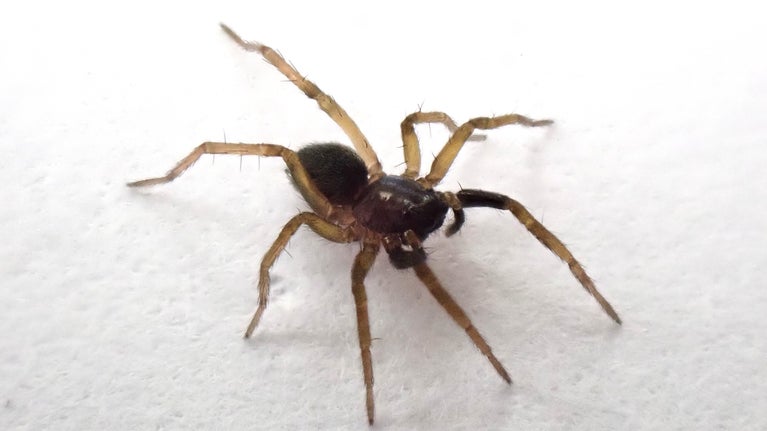Rare spider rediscovered in Britain after 40 years – just in time for Hallowe’en
- Published:
- 30 October 2025
- Last updated:
- 30 October 2025

A critically endangered wolf spider, unseen in Britain for four decades, has been rediscovered on the Isle of Wight, marking a major conservation success.
The tiny, orange-legged arachnid Aulonia albimana, a member of the wolf spider family, was last recorded in the UK in 1985 before being spotted again this autumn at the National Trust’s Newtown National Nature Reserve.
Its rediscovery is a victory for the charity’s conservation project at Newtown, which forms part of Natural England’s Species Recovery Programme, a scheme that provides targeted action for some of England’s most endangered flora and fauna.
The team behind the discovery has informally dubbed the species the White-knuckled Wolf Spider, a name inspired by both the distinctive pale ‘knuckles’ on its palps – the small leg-like appendages either side of the mouth – and the last-minute drama involved in finding it.
It was rediscovered this autumn, some 2km from its former colony, by entomologists Mark Telfer and Graeme Lyons. It is also the first time the species has ever been digitally photographed in the UK.
Mark Telfer, who led the survey, said: “This is one of those unforgettable discoveries. To find a species thought lost for 40 years is thrilling - and testament to how the right habitat management, combined with curiosity and collaboration, can deliver remarkable results.”
Graeme Lyons added: “I suggested calling it the White-knuckled Wolf Spider because this was probably the longest long shot I’ve ever taken part in. We had just four hours at the site where this spider was last seen 40 years ago, before our boat came to pick us up. I found the first one with just nine minutes to go, and the second one in the last minute. I’ve seen 559 species of spider in the British Isles and this one was by far the most exciting find!”
Wolf spiders – of which there are around 38 species living in the UK – take their name from their agile hunting skills, which involve chasing prey along the ground and then pouncing like a wolf. However, the diminutive Aulonia albimana’s hunting techniques remain something of a mystery, as the species is also known to spin a flimsy web.
The discovery took place in a remote area of the reserve accessible only by boat. Once overgrown, the site has been restored by the National Trust with the help of a flock of Hebridean sheep, which chew through vegetation to maintain short, open turf - creating exactly the kind of patchy, sunlit ground the White-knuckled Wolf Spider favours. Trust staff who led the conservation work said the return of such a rare species had been “incredibly rewarding", while the British Arachnological Society called it an “epic” rediscovery.
Dr Helen Smith, Conservation Officer for the British Arachnological Society, said: “The remarkable discovery of this dapper little spider on the Isle of Wight is one of Britain’s epic 'lost species' rediscoveries of the century. With repeated failure to find it at its former sites, where its open habitat has been lost, it seemed increasingly likely that it had joined the country’s sad list of extinct species.
“Graeme's and Mark's dedicated enthusiasm and meticulous search, together with vital habitat restoration work undertaken by the National Trust, shows that the White-knuckled Wolf Spider not only had a place to hang on, but hopefully one in which it can now thrive. We look forward to working with the National Trust to establish the full extent of the population and determine the conditions it needs to expand its range and secure its future.”
The news comes as the National Trust launches a campaign with TV presenter Hamza Yassin to encourage people to go out this autumn in search of wildlife. Called “Wild Senses”, the campaign is inspired by the new BBC series Hamza’s Hidden Wild Isles, which celebrates the British seasons. In last Sunday’s episode, Hamza revealed a new species of fungus that turns spiders into zombies.
Rosie Hails, the National Trust’s Nature and Science Director, said: “Not everyone will have the chance to spot species as rare and mysterious as these spiders, but this time of year is brilliant for wildlife watching. There’s always drama happening in the natural world – you’ve just got to pause to notice it.”